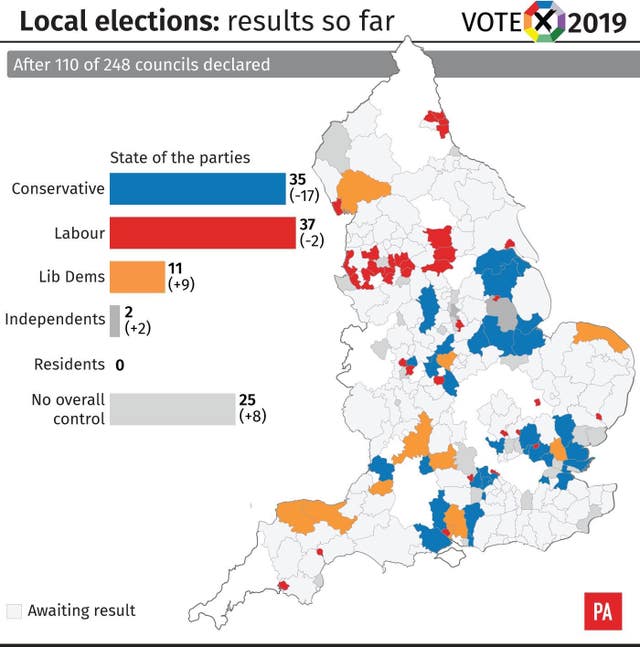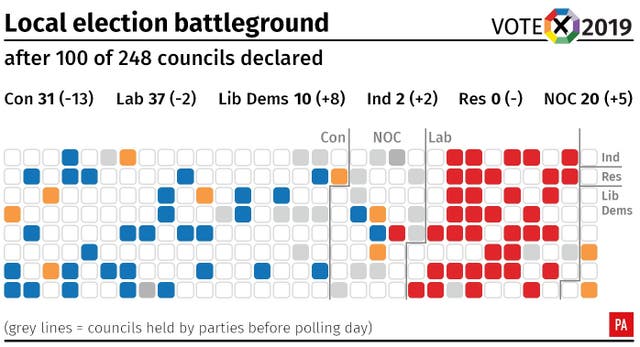Major parties suffer in local elections as voters vent Brexit frustration
Liberal Democrats made gains as both Conservatives and Labour felt voters’ anger.

Voters have vented their anger at the two main parties over the continuing Brexit deadlock as both the Tories and Labour suffered losses in the English council elections.
Conservatives shed more than 425 seats and 17 councils in early results, with voters apparently expressing frustration at the Government’s failure to deliver Brexit as promised on March 29.
There were calls from Tory MPs for Theresa May’s removal as leader, with senior Brexiteer Sir Bernard Jenkin warning that the party would be “toast” unless it “mends its ways pretty quickly”.
But Labour also struggled, losing seats at a point in the electoral cycle when they could expect to be making significant gains at the expense of the Government.
Shadow chancellor John McDonnell said voters were telling the party “Brexit – sort it”, adding: “Message received.”
In contrast, the Liberal Democrats were enjoying a good night, with some predictions that they could pick up as many as 500 seats.

With results in from 109 of the 248 councils where elections are being held, the Conservatives had lost 409 seats and Labour 60, while the Lib Dems had gained 283 and the Greens 35.
There were 85 more independent councillors, while Ukip lost eight.
With some analysts predicting overall Tory loses of 800 seats or more, Conservative Party chairman Brandon Lewis blamed the failure to resolve Brexit.
“People are frustrated with where they see parliamentarians are and the fact that we have found this impasse in Parliament,” he said.
“It’s a stark reminder to everybody in the House of Commons that we need to get past that impasse, deliver on what people voted for, and focus on that as parliamentarians as well.”

The Conservatives lost Peterborough, Basildon, Southend, Worcester, St Albans, Welwyn Hatfield, South Oxfordshire, Folkestone and Hythe, Broxtowe, Tendring and Tandridge to no overall control while Winchester, Chelmsford, Bath and North East Somerset, Somerset West and Taunton, Vale of White Horse, Cotswold and Hinckley and Bosworth fell to the Liberal Democrats, with North Kesteven going to independents.
However the party held on in the bellwether council of Swindon, seen as a possible Labour gain, and took Walsall and North East Lincolnshire from no overall control.
Sir Bernard Jenkin said voters overwhelmingly believed that Mrs May had “lost the plot” and that the time had come for a change of leader.
“They can see that she has lost the plot. They can see she is not in control of events,” he said.
“Certainly among Conservative activists and council candidates there is an almost universal feeling that it is time for her to move on.”
His comments were echoed by former cabinet minister Priti Patel who said voters saw Mrs May as “part of the problem”.
“I just don’t think we can continue like this. We need change, we need a change of leadership. Perhaps the time has now come for that,” she told the BBC.
Labour meanwhile lost control in Bolsover, Hartlepool and Wirral and the mayoralty in Middlesbrough, where its vote was down 11% as independent Andy Preston was elected, although it did gain Trafford from no overall control.
Even where the party held on in its traditional stronghold of Sunderland, which voted heavily for Brexit in the 2016 referendum, it still lost 10 council seats.
Council leader Graham Miller said the party had paid the price for its stance on Brexit, with some MPs calling for a second referendum.
“The people of Sunderland have said ‘We are just not accepting that’. We have seen a massive protest vote on that issue tonight,” he said.
And MP Jess Phillips blamed the party’s position on Brexit, which has seen it offer support for a second referendum only in a limited set of circumstances.
“I think our position on Brexit has failed,” said the Birmingham Yardley MP. “Bravery is needed. If you combine kindness and effectiveness with a bit of grit most people will respect you even when they don’t always agree.”
Labour’s national elections co-ordinator Andrew Gwynne accepted it had been “a difficult set of elections” for the party and that Brexit had “undoubtedly” been a factor.
“We have to look at the reasons why the Labour vote either didn’t come out or felt frustrated and voted for independents and smaller parties,” he told Radio 4’s Today programme.
“Undoubtedly, Brexit played a part in the results. It was the first opportunity people have had to vote and there’s been that sense of frustration.”
Mr McDonnell tweeted: “We’ll see what final results of local elections look like by end of day as they are pretty mixed geographically up to now but so far message from local elections – ‘Brexit – sort it’. Message received.”
However eyebrows were raised as shadow cabinet member Barry Gardiner said in a TV debate that Labour were “trying to bail (Conservatives) out” in Brexit talks.
Mr Gardiner told Brexit minister James Cleverly: “We are in there, trying to bail you guys out. We are now trying to negotiate with you because your Prime Minister, who’s lost control of her party and lost any chance of getting her deal through Parliament, has come to us and said: ‘Please, I now need to listen to the ideas you have been putting forward’.”
Liberal Democrat deputy leader Jo Swinson said: “Barry has said it all, when he said what Labour are doing right now is bailing out the Conservative Government to deliver Brexit.”
Polling expert Professor Sir John Curtice of Strathclyde University said the voters appeared to be punishing whichever of the main two parties was in control in their area.
“The Labour Party is losing where they are strong historically, the Conservatives are losing where they are strong historically. It’s a plague on all your houses,” he said.
In contrast, the Liberal Democrats, who fought on a pro-Remain platform, were in buoyant mood.
As well as picking up councils from the Tories, they took North Norfolk and North Devon from no overall control.
Home affairs spokesman Sir Edward Davey said the results were “equivalent to our best strides forward ever in our history”.
“We are clearly back in the game,” said Sir Edward. “People have been frustrated with the appalling Tory Government, who have let them down not just on Brexit but with cuts to police and schools, and a split opposition with such poor leadership.
“They have been crying out for a strong alternative. The Liberal Democrats have proven we are that strong alternative to the Tories and Labour.”





